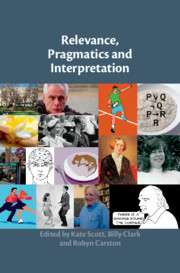Book contents
- Relevance, Pragmatics and Interpretation
- Relevance, Pragmatics and InterpretationEssays in Honour of Deirdre Wilson
- Copyright page
- Contents
- Contributors
- Cover Acknowledgements
- Introduction
- Reflections on the Development of Relevance Theory
- Part I Relevance Theory and Cognitive Communicative Issues
- 1 Scientific Tractability and Relevance Theory
- 2 Language Processing, Relevance and Questions
- 3 Quasi-Factives and Cognitive Efficiency
- 4 Evidential Explicatures and Mismatch Resolution
- 5 Representation and Metarepresentation in Negation
- 6 Pronouns in Free Indirect Discourse
- 7 The Development of Pragmatic Abilities
- Part II Pragmatics and Linguistic Issues
- Part III Figurative Language and Layered Interpretations
- References
- Author Index
- Subject Index
7 - The Development of Pragmatic Abilities
from Part I - Relevance Theory and Cognitive Communicative Issues
Published online by Cambridge University Press: 08 July 2019
- Relevance, Pragmatics and Interpretation
- Relevance, Pragmatics and InterpretationEssays in Honour of Deirdre Wilson
- Copyright page
- Contents
- Contributors
- Cover Acknowledgements
- Introduction
- Reflections on the Development of Relevance Theory
- Part I Relevance Theory and Cognitive Communicative Issues
- 1 Scientific Tractability and Relevance Theory
- 2 Language Processing, Relevance and Questions
- 3 Quasi-Factives and Cognitive Efficiency
- 4 Evidential Explicatures and Mismatch Resolution
- 5 Representation and Metarepresentation in Negation
- 6 Pronouns in Free Indirect Discourse
- 7 The Development of Pragmatic Abilities
- Part II Pragmatics and Linguistic Issues
- Part III Figurative Language and Layered Interpretations
- References
- Author Index
- Subject Index
Summary
In this chapter, Myrto Grigoroglou and Anna Papafragou explore what seems to be a paradox about the development of pragmatic abilities: while very young children are able to perform tasks which demonstrate what is required for pragmatic reasoning, certain areas of their pragmatic performance do not become adult-like until much later. Focusing on the much-discussed topic of scalar implicature, they propose that performance in tasks designed to elicit the derivation of such an implicature is significantly affected by the nature of the contextual material provided. When, for example, children appear not to understand an utterance of the form ‘some X are Y’ as suggesting ‘not all X are Y’, it may be because they have not seen the potential relevance in the particular context of the thought that all X are Y.
Keywords
Information
- Type
- Chapter
- Information
- Relevance, Pragmatics and Interpretation , pp. 102 - 112Publisher: Cambridge University PressPrint publication year: 2019
Accessibility standard: Unknown
Why this information is here
This section outlines the accessibility features of this content - including support for screen readers, full keyboard navigation and high-contrast display options. This may not be relevant for you.Accessibility Information
- 4
- Cited by
